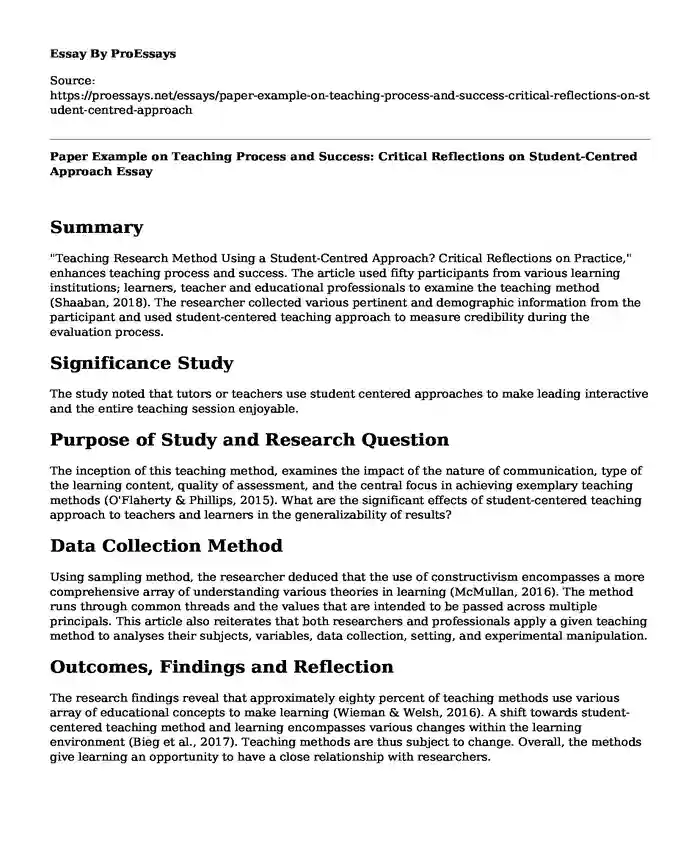Summary
"Teaching Research Method Using a Student-Centred Approach? Critical Reflections on Practice," enhances teaching process and success. The article used fifty participants from various learning institutions; learners, teacher and educational professionals to examine the teaching method (Shaaban, 2018). The researcher collected various pertinent and demographic information from the participant and used student-centered teaching approach to measure credibility during the evaluation process.
Significance Study
The study noted that tutors or teachers use student centered approaches to make leading interactive and the entire teaching session enjoyable.
Purpose of Study and Research Question
The inception of this teaching method, examines the impact of the nature of communication, type of the learning content, quality of assessment, and the central focus in achieving exemplary teaching methods (O'Flaherty & Phillips, 2015). What are the significant effects of student-centered teaching approach to teachers and learners in the generalizability of results?
Data Collection Method
Using sampling method, the researcher deduced that the use of constructivism encompasses a more comprehensive array of understanding various theories in learning (McMullan, 2016). The method runs through common threads and the values that are intended to be passed across multiple principals. This article also reiterates that both researchers and professionals apply a given teaching method to analyses their subjects, variables, data collection, setting, and experimental manipulation.
Outcomes, Findings and Reflection
The research findings reveal that approximately eighty percent of teaching methods use various array of educational concepts to make learning (Wieman & Welsh, 2016). A shift towards student-centered teaching method and learning encompasses various changes within the learning environment (Bieg et al., 2017). Teaching methods are thus subject to change. Overall, the methods give learning an opportunity to have a close relationship with researchers.
References
Bieg, M., Goetz, T., Sticca, F., Brunner, E., Becker, E., Morger, V., & Hubbard, K. (2017). Teaching methods and their impact on students' emotions in mathematics: an experience-sampling approach. ZDM, 49(3), 411-422.
McMullan, M. J. (2016). How Using Technology Enhanced Learning Could Help Modernise Traditional Large Group Teaching or Lecturing. International Journal of Innovative Research in Medical Sciences (IJAMS)(Online), 2455-8737.
O'Flaherty, J., & Phillips, C. (2015). The use of flipped classrooms in higher education: A scoping review. The internet and higher education, 25, 85-95.
Shaaban, S. (2018). Reporting the impact of Student Centred Learning (SCL): Interactive learning experience based on a small-scale study in undergraduate business classes. International Journal of Higher Education Management, 5(1).
Wieman, C., & Welsh, A. (2016). The connection between teaching methods and attribution errors. Educational Psychology Review, 28(3), 645-648.
Cite this page
Paper Example on Teaching Process and Success: Critical Reflections on Student-Centred Approach. (2023, Jan 26). Retrieved from https://proessays.net/essays/paper-example-on-teaching-process-and-success-critical-reflections-on-student-centred-approach
If you are the original author of this essay and no longer wish to have it published on the ProEssays website, please click below to request its removal:
- Personal Essay Example: My Views on Zoos
- Application for Campus Transfer
- Riyadh: My Home, My Childhood, and My Realizations - Essay Sample
- Essay Example on Child Neglect: Denial of Basic Needs, Severe Consequences
- Paper Example on Fairy Tales: A Lesson Plan for Improving Reading and Listening Skills
- Essay Example on Cognitive Development: Piaget's Stages of Growth in Children
- Paper Example on Ethnographic Research: Studying Childhood Development in Schools







